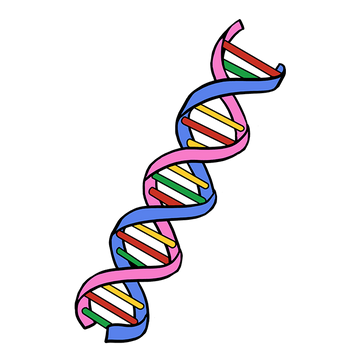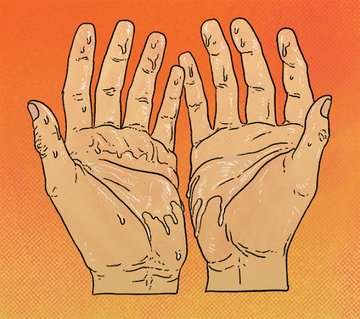Hyperhidrosis, by-and-large, is a condition that seems to arise from genetic predisposition. Research has shown that having a family member with the condition increases the risk of other family members developing it as well. With that said, some genes have been isolated as potential contributors to the condition.
Determining the impact of genetics on hyperhidrosis may help researchers discover better treatments. Also, family members who have the condition should also understand how this may affect their relatives and what they can do to educate them.
Statistics Surrounding Hyperhidrosis Genes
The current theory regarding the biological causes of hyperhidrosis right now is an overproduction of acetylcholine, a neurotransmitter which plays a major role in sweat production. But where does it start? Genetics appears to be the underlying cause of a nervous system that produces too much of this acetylcholine.
There’s now convincing evidence and stats to show that hyperhidrosis is indeed genetic. Researchers have conducted a series of studies on hyperhidrosis sufferers that have demonstrated patterns that show the condition has a familial trait.
Studies Reveal a Pattern of Hyperhidrosis Having Genetic Origins
- A study from 2010 revealed 34.1% of patients had a family history of hyperhidrosis
- A 2009 study analyzing sufferers of palmoplantar hyperhidrosis in Japan found that 36% of them had a family history of the condition
- A 2015 study found that 45% of hyperhidrosis sufferers had a positive family history of the condition
Several other studies have been conducted from the early 2000s onward, many of which have found patterns of heredity. In general, researchers estimate that 30-50% of sufferers have a family member who also suffers with the condition. There’s also speculation that hyperhidrosis can get passed down from generation to generation since many patients also have grandparents who have suffered from excessive sweating.
Putting a Finger on Hyperhidrosis Genes
Genetic research is still in its youth. Nevertheless, scientists are getting better at identifying genes and gene mutations responsible for various illnesses. In the case of hyperhidrosis, a few genes have come under the microscope (excuse the pun) and seem to play a role in making people sweaty.
The two main genes that have links to hyperhidrosis are the butyrylcholinesterase (BCHe) and Cholinergic Receptor Nicotinic Alpha-7 subunit (CHRNA7) genes. Both genes appear to influence the activity and production of acetylcholine, and mutations of these genes can lead to abnormal production of the neurotransmitter.
One study in particular attempted to identify whether hyperhidrosis patients carried these gene variants. Researchers collected DNA samples from 21 case participants (hyperhidrosis sufferers) and 21 control participants (non-sufferers). Their goal was to find whether or not the individuals with excessive sweating carried mutations for the above-mentioned genes, namely, the BCHe gene (K-variant).
What were the results? Among the 21 case participants, the ones who had hyperhidrosis, 67% tested positive for k-variant of the BCHe gene compared to just 33% of the 21 control participants (those without the condition).
This study supports the belief that hyperhidrosis is genetic, and that abnormal production of acetylcholine comes from having certain gene mutations.
Treatment Possibilities for the Future With Further Genetic Understanding
Of course, the question you have at this point is why any of this genetic/biology mumbo jumbo even matters. After all, it seems like it would only interest those who wear lab coats and handle test tubes all day.
Well, identifying a genetic basis of this sort can empower and give hope to hyperhidrosis sufferers. If more awareness of a genetic cause for excessive sweating spreads, more non-sufferers may understand and sympathize with those who deal with the condition. The stigma of excessive sweating may slowly fade. Myths about it being a hygiene issue may disappear and doctors and others may finally accept how debilitating the condition can be.
But one of the most important implications for understanding the genetic links of excessive sweating is for the purpose of treatment. The more we understand the functions of hyperhidrosis-related genes, the more effectively doctors can treat the condition.
Researchers may get a better handle on understanding what kind of supplements, diets and other lifestyle interventions may impact those genes. This may allow patients to treat their condition more precisely and avoid relying on band-aid solutions that may carry unwanted side effects.
Parents With Hyperhidrosis Can Educate Kids
Genetic research can also help parents and their children find closure. Think about this: a kid who gets teased for having sweaty palms or armpits may also have parents and other adults who downplay their condition. Harassment combined with neglect can be very isolating and damaging to their self-esteem.
However, a genetic report that shows an increased risk of hyperhidrosis (in combination with a diagnosis) can educate and enlighten families. Parents will feel informed and children will feel validated. Ultimately, this creates an environment where families can openly discuss the condition, and more importantly, seek treatment for hyperhidrosis.
With that said, direct-to-consumer (DTC) genetic tests are now widely available, and there are online databases that consumers can use to discover if they carry “hyperhidrosis genes”. Here’s an example report from Ancestry DNA:

This example shows a DNA report for an individual who may carry a BCHe gene variant. It explains what each label means. As you can see, carrying the C/T version with the K-variant, increases the likelihood of suffering from hyperhidrosis. Carrying the T/T version with the K-variant significantly increases the risk of suffering from the condition. This data can be paired with results from a hyperhidrosis disease severity scale (HDSS) assessment, to further support a diagnosis of the condition.
Creating a New Blueprint for Hyperhidrosis
Until fancy gene-correction therapy becomes en vogue, you’ll have to rely on the current crop of hyperhidrosis treatments. But these options continue to grow. From prescription-strength antiperspirants to anticholinergic drugs, from iontophoresis to sweat resistant fabrics, there are several ways to control sweating.
At least for now, genetic testing can help families come to terms with the condition and advocate for themselves. In the near future, however, these tests may help sufferers pinpoint the precise lifestyle choices that will bring them lasting relief.
Want to learn more about hyperhidrosis and ways to manage it? Check out our Neat Freaks blog for helpful tips and insights to control excessive sweating.








